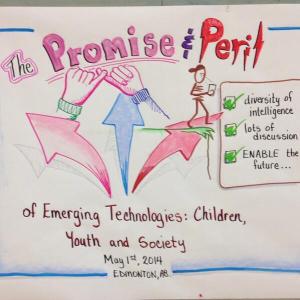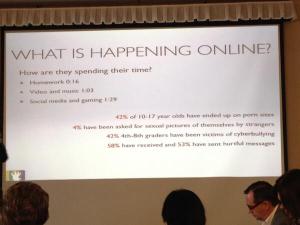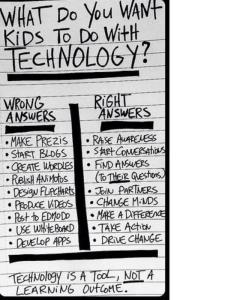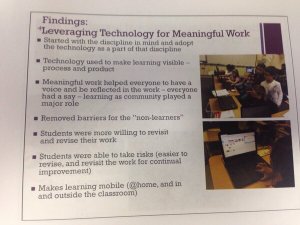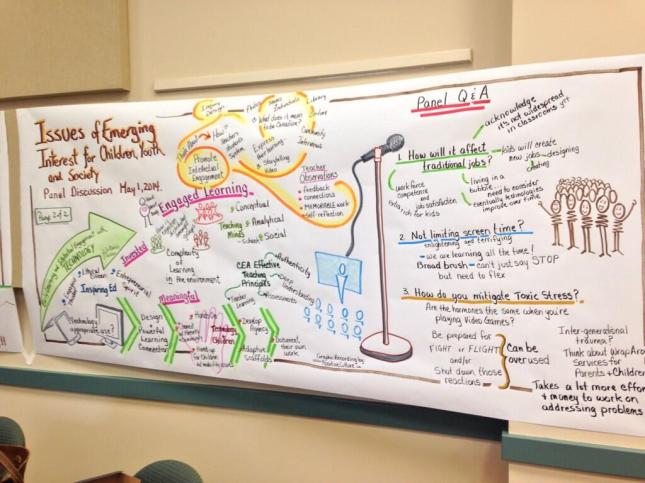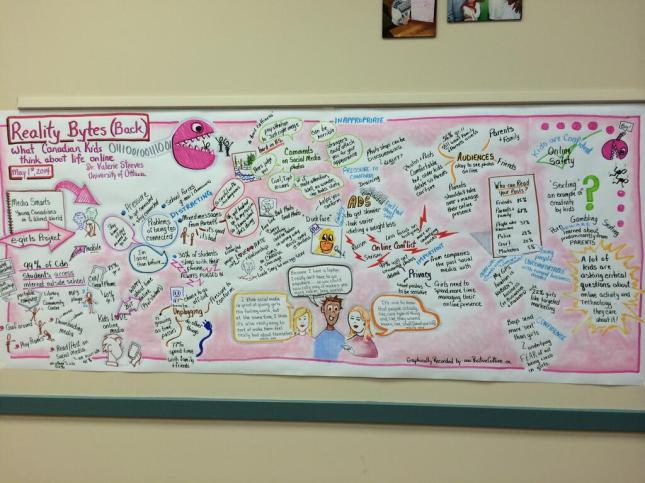Today, I had the opportunity to sit and learn with people from across North America, the UK, Finland and Australia from various sectors of education, health, research, police, trades and government.
This is a time of infinitesimal technological change where we all need to understand the immense impact of the digital environment has on our health and well-being.
I had the honor to facilitate the thoughtful conversations that occurred between keynote speakers at my table. This blog will reflect my personal thoughts, table thoughts and that of the main group attending the research colloquium.
The intended goals were to:
– consider the extent to which technologies are (re)shaping the minds and bodies of children and youth
– identify the issues, perspectives and contentions emerging from current North American research
– generate key questions to guide policy decisions and future research on emerging technologies, learning, teaching and the well-being of children and youth
Dr. Michael Rich
Dr. Michael Rich, Associate Professor of Pediatrics at Harvard Medical School and Associate Professor of Society, Human Development, and Health at Harvard School of Public Health, Boston, United States Full Bio
Centre on Media and Child Health – Explore Dr. Rich’s extensive work on behalf of Children’s Hospital Boston, Harvard Medical School and the Harvard School of Public HealthCBC national panel discussion on Youth and Technology (February 2014)Ask the “Mediatrician” a question
Dr. Rich took us on quite a journey:
– The average 8-18 year old uses media for 7 hours and 38 minutes per day
– Kids are getting less sleep because they are using their devices during bed time which means less sleep = less consolidation of learning (the brain cannot process the days learning since it isn’t in full REM long enough or deep enough)
– Those students who are heavy users (16+ hours/day) have poorer grades, are twice as likely to get in trouble and have low personal contentment.
– What we feed a child’s mind is as important as what we feed their body
– There is value in boredom – do youth have time to be bored anymore with the large amount of time spent with media content?
– ¼ of 8-9th graders say that video gaming gets in the way of their studies
– Video games are set environments and conditions where players direct, rehearse and are rewarded for behavioral scripts
– Kids don’t understand that when they set up their profiles in various social media sites that advertisers are already connecting their products to those profiles
– 58% of cyber bullied victims do not tell adults for fear of losing access to their media. Many youth stay online in self defense as they fear of missing out.
– Social media is neutral; human nature makes it the promise or peril
– A lot of characteristics of drug addictions are consistent for addictions to media/technology
– Take a digital Sabbath – 24 hour period once a week where you turn off your devices.
– The following news items are great to share with parents or in school newsletters. For even more check out http://www.cmch.tv/ and http://cmch.typepad.com/mediatrician/.
- The Internet Talk for Preschoolers
- The Internet Talk for School-Age Children
- The Internet Talk for Tweens
- The Internet Talk for Teens
– Use media with your children in their digital space, talk to them about the experiences and don’t use time limits on screen time, rather, prioritize their life with rich and diverse activities
– Kids with severe health issues are able to connect online with their clinicians
– Embed media literacy with the curriculum through mindful reception, critical thinking and thoughtful responses
Panel Information
Catherine Adams, Assoc Prof from University of Alberta
Nicole Sherren, Director, Norlien Foundation
Michele Jacobsen, Assoc Prof from University of Calgary
– Technology as pharmakon – it can be seen as a remedy and as a poison. Too little and it doesn’t work, too much and it is poisonous
– Technology not only affects the individual but the entire system
– Neural circuits are developed from the bottom up. The brain strengthens the circuits used most. Positive builds positive.
– Executive function helps kids navigate their world n succeed in life + based on cog, social, emotional competencies
– AB Family Wellness Initiative http://www.albertafamilywellness.org/ – fantastic site w/brain resources
– Stress shapes brain architecture – types: + (brief acts, required), tolerable (serious but temp), toxic (prolonged, damaging)
– New research: 78% of 12-17 yr. olds have mobile phones, 47% have smart phones.
– If we value our kids, they can acquire AND contribute ideas to shape their society
Dr. Valerie Steeves
Dr. Valerie Steeves, Associate Professor, University of Ottawa, and principal investigator of the largest Canadian research study on children & teens’ online habits. Full Bio
Cyberbullying: Dealing with Online Meanness, Cruelty and ThreatsOnline Privacy, Online PublicityLife Online
– 99% Cdn students access internet outside of school, 62% use tablet/mobile device
– Children’s’ internet use is highly gendered
– 25-33% students post digital content, but only 4% do so frequently. 50% search for info/current events
– students’ frequent online activities – gaming, downloading, reading SM posts, Twitter following n posting
– content creation focuses mainly on students social lives
– The idea we can throw tech at kids and they will instinctively innovate does not appear to be supported by research
– Top sites for Cdn Kids – YouTube Facebook and Google
– Over 50% of Canadian grade 11 students report sleeping with their cell phones. 20% of grade 4 students report the same thing
– kids who choose 2 go offline – spend time w/friends/family, quiet time, outside sports
– Besides the gr8 resources, Media Smarts has an informational edtech blog http://mediasmarts.ca/blog
– Influence of photoshop and girls images of themselves
– Who do kids say they learn digital literacy from? 45% say from parents 41% say from teachers
– Cyberbullying – big range of behaviors – mainly drama-based from kids points of view – they say adult standards are unreasonable
– Internet filters & blockers don’t build trust with students. How do we create avenues of trust when we’re putting up barriers?
OVERALL
– it’s about the relationships both online and offline
– marketization of the online environment – children’s data being used by companies
– we need to unplug but need some solid “how much”/core direction to move forward
– talk to children/community about when and how much screen time is appropriate
